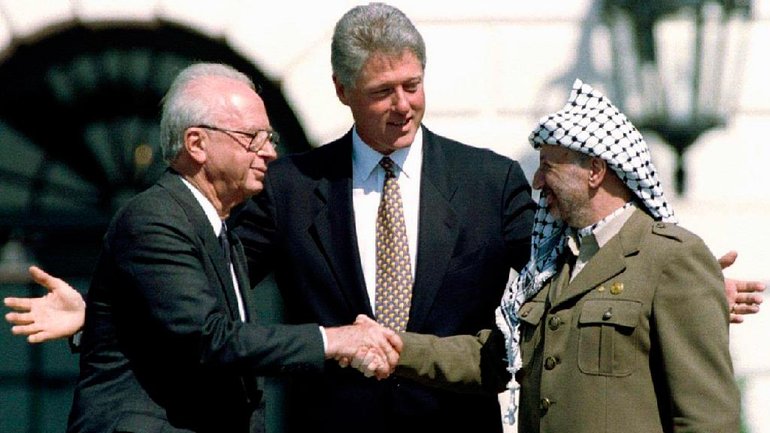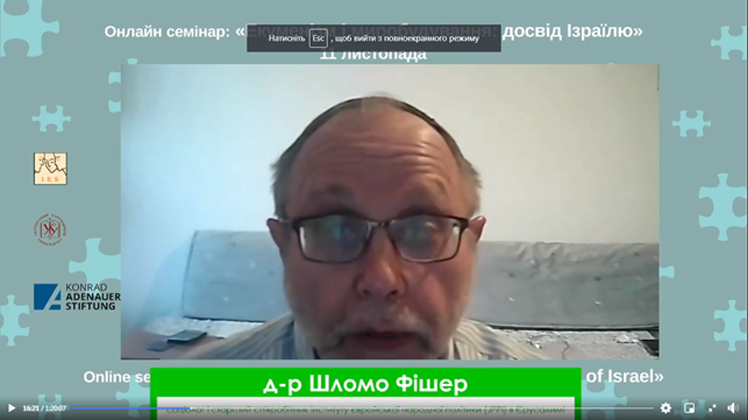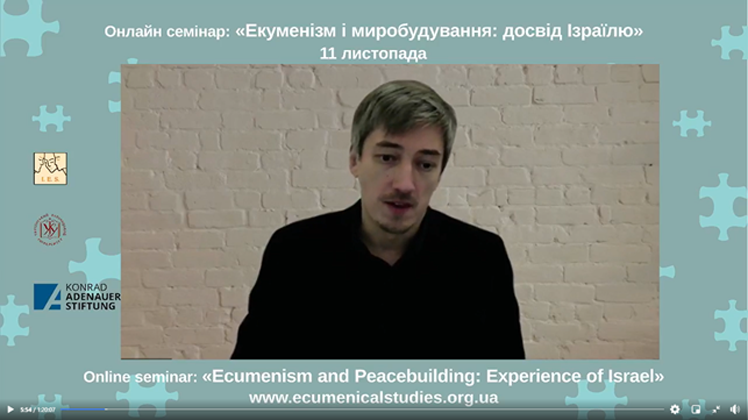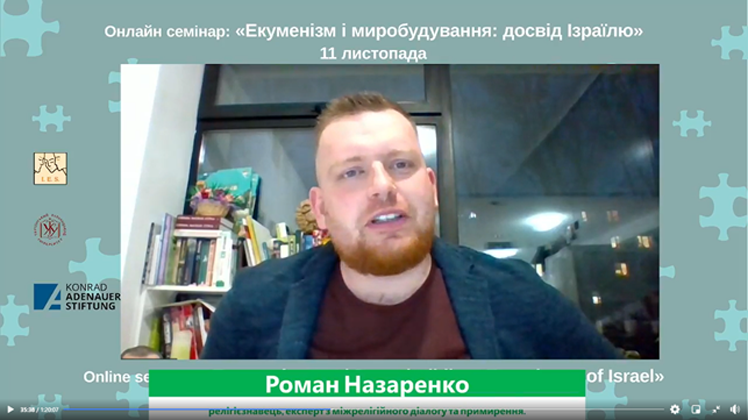"Peace on paper doesn't mean anything," - Dr. Shlomo Fischer

The idea of organizing such seminars is to look at the conflict in Ukraine through the perspective of experiences of similar conflicts in other countries so that we distance ourselves from our situation and look at how peoples resolved such situations," the Institute of ecumenical Studios reported.
Speaker Dr Shlomo Fischer a sociologist and senior fellow at the Institute for Jewish people's policy (JPPI) in Jerusalem, first presented an overall picture of peacebuilding in the conflict between Israel and Palestine.

"In 1993, we had negotiations, the Oslo agreement is an initiative on the Israeli side, but it failed. Later, there was another attempt in September 2000. In fact, we have a major initiative that people have been waiting for since the 1970s-and it was crowned with defeat in the 2000s. Although there are people who support peace, there are no secular initiatives involved. This is partly due to the government, which has been in power for 12 years. Also because there is a loss of confidence and trust on the part of the Israeli population and the Palestinian public. Now there is a kind of coexistence."
An integral part of the Oslo process, this secular peacebuilding process, was the need to conclude agreements between states. The settlement agreement is that the state is a stable entity. Since there is a Palestinian state, there will inevitably be a division.
Dr. Shlomo Fischer formulated several theses on the discourse of peace between Israel and Palestine:
- The idea is to somehow live together with the Palestinians. The fundamental metaphor is the metaphor of marriage: we are together in this situation, neither of us is going anywhere, we somehow have to live together, establish a dialogue. This approach is very practical, non-messianic. We try to work on human relationships. Because peace on paper doesn't mean anything.
- The simultaneous truth of two contradictory narratives – Jewish religious and Palestinian. These two narratives contradict each other but are also true. For God is paradoxical, life is paradoxical, and in God everything is possible, and there is no way without a miracle. The relativity of truth and the paradoxicality of truth are two contradictory things at the same time.
- Dialogue with others and anti-triumphalism. In the Israeli conflict, anti-triumphalist theology says that the Israeli state is not a return and redemption. After all, divine ideals are not attained. God, in his power and Infinity, cannot fit into any one religion. Therefore, we must cooperate in dialogue with other religions in order to discover other parts of the truth. This is part of the basis for dialogue with Islam, with representatives of Islam.
- The idea of one territory for two states. This contradicts everything in European history. Since 1648, it is impossible to have two state units on the same territory. This contradicts the idea of creating a state. But all this is based on the fact that it is possible to have two conflicting narratives that are simultaneously true.
- A religiously-inspired world is miraculous and paradoxical. This imposes anathema on the secular view of the world. On the other hand, there are people "at the bottom" who are in dialogue, treat each other, receive local Muslims, representatives of the Muslim population. This suggests that there is a miraculous act.
- Peace is a process, not a result, there is no end to dialogue. The agreement is important, but it is even more important to live together and understand that it is a process. There are failures, scrapes, not everything is perfect. But we are constantly working on this with the belief that the miraculous element will still manifest itself. There is always a dichotomy here. The sociological paradox is that people who are ideologues and theologians are people who always have a close connection with the Palestinian population.
- As the mainstream process failed, people started asking questions: what other opportunities do we have? Then we said that we have a religious peacemaking camp. Because nothing else has happened since the defeat of the Oslo Accords a few decades ago.

"Today we are talking about Israel. What struck me about Dr. Shlomo Fischer's report? Modernist-critical approach: there are two nations in one country, if you become a minority, you don't know how to deal with the system. For us here, the question is that maybe we could avoid the trap that Border = nation. The second is the idea of theologians ' contribution to peace-building and the idea of two narratives that are both contradictory and true, true. Because the Lord God himself is paradoxical. How churches can play a pluralistic game is something to think about, " said the moderator of the seminar, director of the Institute of ecumenical studios of UCU Dr. Pavlo Smitsnyuk.
The respondent at the seminar was Roman Nazarenko, religious scholar, author of publications and lectures on interreligious dialogue and reconciliation, a doctoral student at the Faculty of Theology of Tilburg Catholic University.

"Working in the field of interreligious dialogue and remembering the context of the Israeli-Palestinian conflict, I understand that religion always plays an important role. I was struck by the way Dr. Fischer presented interreligious dialogue. When we talk about the situation in Israel, it is important for me to note the Palestinian side. Because if we are talking about various political conflicts where misunderstandings occur at the human level, then this is easier because you can always find some kind of consensus. But when the religious factor comes into play, when religion is the main stumbling block, it is always more difficult. When we talk about the Israeli context, there are not many voices that are as progressive and open about the situation as Dr. Fischer.
The Holy Land is sacred to various religions. If we were talking exclusively about the political element or the element of human relations, it would be easier. But when the religious factor is turned on, speculation sometimes occurs even at the religious level. There is a politicization of religion or religiosity of politics. There are various attempts by individual trends or parties to use religious factors for their own interests. The narrative presented by Dr. Shlomo Fischer opens up the prospect of future cohabitation between the two sides. These are very practical dimensions of dialogue. Because understanding the possibility of coexistence of these two paradigms of thinking can be a healing factor for the future understanding that will come on the territory of Israel," Roman Nazarenko said.
The next seminar of the project "Ecumenism and Peacebuilding: International Lessons for Ukraine" will be held on November 17 at 17.00. It will consider the experience of Lebanon.









